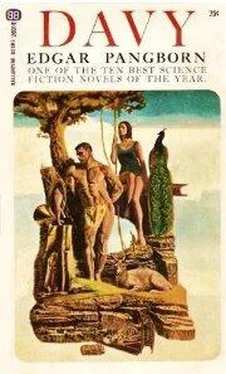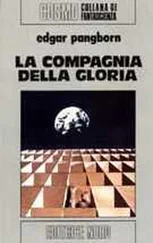All the same, Old City has a flock of statues to make Hamden or any other town look sick. Most of them are of Old Time, which in Nuin is sometimes made to seem almost like yesterday, an illusion I never felt in any other place. I’m thinking at the moment of a fine seated bronze gentleman in Palace Square, who carries clear traces of ancient paint in the cracks and hollows of his patinaed garments. It’s Old-Time paint, they say. Some President — Morgan II, I think — had it covered over with thick modern varnish to preserve it. It appears in patches of crimson, green, and purple; no blue. Odd to think that this unknown religious ritual must have been going on in the very last days when the Old-Time world was passing away. The inscribed name of the subject of worship is John Harvard. Nobody seems quite clear about who he was, but he sits there modestly, rather stuffily, with timeless and splendid indifference.
I wore new clothes that day at Hamden, a new shouldersack for my horn that Minna had sewed for me, and there was money in my belt, for the Ramblers had taken up a collection and showered me with every sort of kindness. I had still no clear aim, no plan; at eighteen, no true decision what work I would do. I knew a little carpentry, a little music; I knew the wilderness and the ways of the roads. I knew I was a loner by trade.
In the inn at Hamden I found myself in the middle of a bunch of pilgrims who were finishing the last part of what Nuin people call the Loop Journey. It means a trip from Old City up into the wild glorious mountain land of the Province of Hampsher — more people live up there in the cool hills than you’d ever suppose-then south more or less following the great Conicut River as far as Hamden or Shopee Falls, and back to Old City by southern roads. It is a secular pilgrimage. The Church approves it, and stops are made at all the holy shrines and other foci of piety along the way, but there’s nothing specifically sacred about the junket itself. Anybody can play, and many do, including respectable sinners and card-sharps and musicians and prosties and all the other folk who keep life from getting dull.
Almost as soon as I entered the taproom after engaging a room for the night, a dark boy made friends with me, and I spotted him for a sinner right away because of his open kindliness and good nature. He was dressed in a Nuin style that was beginning to spread beyond that country but not enough so that I’d grown used to it — baggy knee-length britches and a loose shirt, belted in but allowed to flop out over the belt everywhere except at the knife-hilt, where it might interfere with a quick draw. About half the other pilgrims in the taproom were dressed in that style, but the boy who took it on himself to greet me and make me feel at ease was the only one who carried a rapier at his hip instead of the usual short knife. He had a knife too, I learned later, but wore it under his shirt as I used to wear mine before my Rambler days.
That rapier was a beautiful wicked thing, less than two feet long, light and delicate, scarcely half an inch at the widest point, of Penn steel so fine that it sang to a touch almost like dainty glassware. A rich man’s tool, I thought, but I had learned from Mam Laura that one didn’t ask about the price of such a thing unless one meant to buy, and often not then. The boy handled it like an extension of his arm. He liked to make it float almost noiselessly from the scabbard, and run his fingers airily up and down the side as if his mind weren’t with it at all, which made everyone in the room extremely nervous for some reason and of course anxious not to show it. Nothing indicated how much he enjoyed this except a very light crinkling of the skin at the corners of his brown eyes, and some instinct seemed to tell him when to put it away. Instinct, or a special tone in the throat-clearings of one of the priests in charge of the group.
There were two of these, Father Bland and Father Mordan, one fat and one thin, one greasy and the other a bit dry and scurfy. Father Bland himself remarked that they represented the good bacon of religion, and everyone obligingly laughed except Father Mordan the lean one who stayed in character, that is to say grumpy. I’d hardly have taken any of the crowd for pilgrims if the landlord hadn’t tipped me off, and I learned that some were really just travelers who had joined the group for safety or sociability.
“Compliments of Father Bland and Father Mordan,” said the boy in greeting me, “and will you drink wid us now or a little sooner?” I hadn’t heard much of the Nuin accent at that time. Nuin people don’t travel very often outside their own land — Nuin has everything, they say, so what would they gain by it? I guessed the boy to be near my own age, though he acted older. There was a slightness and a delicacy about him that suggested the femmme, but without weakness. I remember in the first half-hour I knew him I wondered if his little games with the rapier might not have a practical side, as a way of discouraging anyone who might misunderstand his nature.
“Honored,” I said — an item of social jazz that I happened to remember from Mam Laura’s coaching. “Honored and delighted to drink anyone under the table or else join him there.”
“Nay, we’re a soberish crowd,” he said. “Everything in moderation. Including, I insist, moderation — but that’s a point I can seldom get across to my elders.” He was watching me with uncanny sharpness. “I’m Michael Summers of Old City. Forgive the impudent curiosity — who are you, sir, and where from?”
“Davy — that is, David — of — well, of Moha — I mean—”
“David de Moha?”
“Oh lordy no!” I said, and noticed that everyone in the taproom had shut up, the better to enjoy our private conversation. “I just meant I come from Moha, back along. My last name’s — uh — Loomis.”
I’m sure he believed, for a while at least, that I was giving a false name, and he wanted to help me with it. He took me over to the others, introduced me as David Loomis with the nicest casualness, pushed me into a comfortable chair, called for fresh drinks — all as if I were somehow important, I couldn’t think why.
From scraps I heard before they went quiet, I knew Father Mordan, the thin dry one, had been instructing the company concerning original sin, a regular duty which he’d pretty well wound up for the day — anyway he was ready to acknowledge Michael’s presentation of me with a smile. The smile would have quickly hardened the grease on a flaming plum pudding, but he meant it kindly; some people just happen to be born with vinegar for blood and lemons for balls, that’s all it is.
“Rest yourself,” Michael said to me, “and look us over, man, the way you might care to travel wid us a little distance, or all the way to Old City if you’re a-mind. We start for there tomorrow, last part of the Loop Journey, back home to our own honest beds and beans and bosoms.”
I couldn’t have said no to Michael, and anyway it was what I wished. I loafed there while we talked and sang the day into night. There were two or three fair singers, and a girl with a lively guitar; with my horn, it made an evefling of music, and I drank enough to help me avoid noticing how far it was from Rambler standards. Nay, it was only the drinks and Michael that kept me from going mad with homesickness — no other word; homesickness for a cubby-hole on wheels with no destination except the next village down the road.
Except for Michael and the two priests and one other, those pilgrims have become dim in my memory, and I’ve forgotten the name of the one other. He was a fine old gray gandyshank drink of water with droopy four inch whiskers on his upper lip that made you want to ring him like a bell, but he seemed to be a good deal of a scholar, so you let the impulse slide. When Michael introduced us he said on a soft sigh: “Mmmd.” Michael told me later that this is how you say “Charmed!” in Oxfoot English, which is what the gandyshank spoke. I don’t know why they call it that — there’s very little real bull in it, and hardly any English.
Читать дальше












